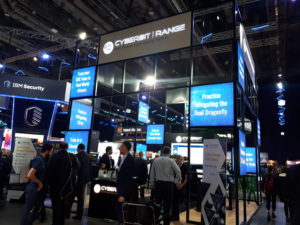Growing attempts to target critical national infrastructure and proliferation of cyberattack tools in variety of sectors among most prevalent threats, industry leaders say
Israeli cyber industry leaders are calling for a broad network of experts to work together to counter a growing number of threats in the digital arena, among them attacks on critical national infrastructure and attempts to infiltrate security organizations.
Speaking on stage at the Cybertech Global 2020 summit in Tel Aviv, Israel’s National Cyber Directorate (INCD) head Yigal Unna said that “the worst and biggest manmade threat today is a cyberattack.”
“There is a shortage in workforce globally, it’s no secret,” Unna said. “As the industry grows more digital and [more] sophisticated, so do the hackers grow more dangerous. But this is about getting everyone working together on it globally. We need to join forces.”

Israel’s National Cyber Directorate head Yigal Unna speaks on stage at the Cybertech Global 2020 summit in Tel Aviv, January 29, 2020. (Oded Karni)
Unna revealed that the INCD recorded roughly 8,600 reports and alerts in 2019, but added that no attacks were able to successfully target critical national infrastructure.
During the summit, Israeli Energy Minister Yuval Steinitz also revealed that Israel had successfully neutralized a “serious cyberattack” on its main power stations a few months ago.
Cybertech Global is Israel’s largest cyber technology summit. Over 18,000 industry leaders, government officials, investors and entrepreneurs from Israel and abroad convened to discuss the cyber revolution and how it impacts a wide variety of sectors. More than 200 local and international companies, as well as 180 speakers, took part in the event, which featured specialists in artificial intelligence, health care, transportation, finance, aviation, and defense, among other industries.
Echoing Unna’s calls for collaboration, Israel Aerospace Industries (IAI) announced that chipmaker Mellanox Technologies would be joining the Israeli Cyber Companies Consortium (IC3). IC3, which is headed by the state-owned IAI, operates under the auspices of the Israeli Economy Ministry. It was founded in 2016 to provide a comprehensive solution to the cyber threats facing governments worldwide and includes tech giants such as Check Point, CyberArk and Verint.
“Each company has segments of the solution, so [we] decided to join together with other Israeli companies in order to be able to offer our end users an end-to-end solution,” Esti Peshin, vice president and general manager of the Cyber Division at the IAI, told The Media Line. “The threats are constantly evolving so there is no one single company that today is able to offer an end-to-end solution to all the cyber needs of high-end customers like nation-states, critical infrastructure and large enterprises.”
According to Peshin, there are presently six trends in cybersecurity which constitute the most important strategic threats: state and superpower involvement in cyberattacks; cyber-crimes; attacks on critical infrastructure; intellectual property theft; the proliferation of cyberattack tools; and finally, computer network influence or CNI.
CNI, Peshin explained, is “targeting our minds [and] trying to influence public opinion or influence the results of elections around the world. These attacks are basically undermining democracies around the world.”
Simulating Cyberattacks
In the realm of cybersecurity, the dangers are vast and one company has found an innovative way to combat what they view as a lack of preparedness on the part of security teams.
Cyberbit is a wholly-owned subsidiary of Elbit Systems, Israel’s largest security contractor. The company has created a hyperrealistic simulation platform to train security experts and is currently working with governments, banks, airlines and airports around the globe. In addition, they have partnered with Purdue University in order to enable faculty and students to learn how to counter attacks in real time.

A view of the Cyberbit booth at the Cybertech Global 2020 summit in Tel Aviv, January 29, 2020. (Maya Margit)
“The people who are actually managing cybersecurity operations are not ready,” Sharon Rosenman, vice president of marketing at Cyberbit, told The Media Line. “They’re overwhelmed and they’re not ready for a simple reason: they’ve never seen a cyberattack before until it actually happens. That’s the biggest threat that I’m seeing.”
Rosenman explained that Cyberbit uses a bot to simulate attacks, rather than a team of hackers.
Transportation is another key sector that is expanding its cybersecurity offerings. SafeRide, an automotive cybersecurity company, provides protection for smart and autonomous vehicles, which are increasingly connected to online networks and therefore vulnerable to being hacked.
“It starts just with people who want to show that they can [hack vehicles],” Danny Loeb, head of Strategic Alliances and Partners at SafeRide, told The Media Line. “It continues with rival companies that want to gain market share by harming others and even goes down to national security aspects, where terrorist groups would be trying to intimidate other countries by manipulating the foundations of their economy.
“Transportation is the foundation of economy in many ways,” Loeb stressed, underlining that Saferide is currently working with the Renault-Nissan-Mitsubishi Alliance and the Singapore-based company ST Engineering to address the issue.
While SafeRide is focusing its efforts on transportation, Israeli company Secret Double Octopus is attempting to do away with a ubiquitous aspect of contemporary digital life that is often targeted by cybercriminals: passwords.
Founded in 2014, Secret Double Octopus relies on phone-based authentication and cryptographic keys to enable users to log in to computers and other devices.
“We allow organizations to completely get rid of passwords in the workplace environment,” Inbal Voitiz, vice president of marketing at Secret Double Octopus, explained to The Media Line. “Passwords are a huge hazard both for the users and from a security standpoint.”
Voitiz believes that most passwords will soon become a thing of the past as more and more companies opt for biometric verification and multifactor identification.
“The way that you store and protect data is key and we really need to pay attention because our identity is exposed not only in the physical world but also in the digital world,” she asserted.
Israel is widely viewed as a leader on the world cyber stage, raking in 20% of venture-backed cyber investments across the globe, according to the PitchBook and Start-Up Nation Central databases. A new report by the IVC Research Center showed that there are 436 active cybersecurity firms in the country and that they raised over $6 billion in the past six years.